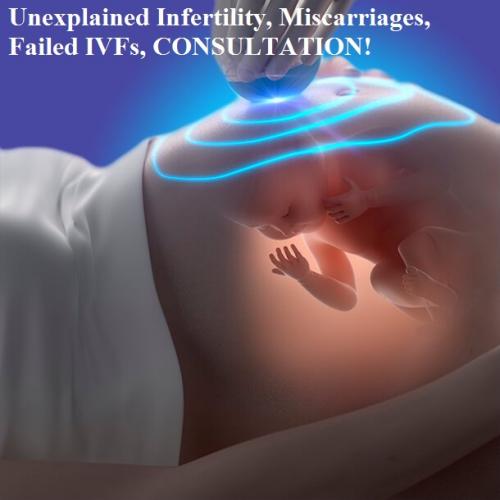IMMUNOLOGICAL FACTORS AND TESTING IN REPRODUCTIVE FAILURE (miscarriages and IVF trials)

Dr. Ioannis John Toliopoulos, PhD. Post Doc, Reproductive Immunology
Reproductive failure is a profound personal tragedy to the couple seeking parenthood and a formidable clinical challenge to their physician. It encompasses a quite wide variety of diagnoses such as recurrent pregnancy loss (RPL), unexplained infertility, IVF failure, endometriosis, premature ovarian failure and some others, with common result from post-fertilization failures, either before or after implantation. Now it is well known that the immune system plays an important role in the success of pregnancy and any abnormality in its function can cause a failure. Some immunologic molecules/factors are of exceptional importance in human reproduction. A number of these factors have been evaluated and validated as targets for immunologic tests in the diagnosis and management of cases with reproductive failure, so that appropriate therapy can be applied. In our laboratories, for 3 year period, 6000 patients with different causes for reproductive failure had been tested and more than 80% of them showed one or more abnormal test results.
An immunologic cause for infertility has been suggested for over 80% of otherwise unexplained cases, which are considered to be more than 25% from all infertility problems. Of couples with unexplained infertility or IVF failure, approximately 30-40% will have an autoimmune component; 35-45% will have an elevated of circulating natural killer (NK) cells or abnormal NK functional activity; 10-20% will have circulating embryotoxins in the blood. An immunologic cause for recurrent pregnancy loss (RPL) has also been suggested for over 80% of otherwise unexplained individual cases. Of couples experiencing unexplained RPL, approximately 20-30% will have autoimmune components; about 40% will have elevation of circulating NK cells; and 10-15% will have circulating embryotoxins.
Autoantibodies
Autoantibodies reported to be associated with reproductive failure include antiphospholipid antibodies with its related lupus anticoagulant, antinuclear, and antithyroid antibodies. If antibodies exist in maternal circulation as a consequence of allogenic stimulation during pregnancy, they are not autoantibodies unless they existed before the pregnancy. Although no clear increase in autoantibodies occurs during normal pregnancy, an increase has been observed in abnormal pregnancy. Most recently also been shown that phospholipid and nuclear antibodies have also a direct effect on the preimplanted embryo.
Antiphospholipid antibodies (APA)
Several diseases have been correlated with the presence of autoantibodies to phospholipids. Women with history of RPL, venous or arterial thrombosis, thrombocytopenia, circulated lupus anticoagulant, or an elevated APTT (activated partial thromboplastin time) are among those at high risk of developing antiphosholipid antibodies. Phospholipids function as adhesion molecules and interfere with the formation of syncytiotrophoblasts from cytotrophoblast. In late pregnancy they have been associated with decudual vasculopathia, placental infarctions, and thrombosis. When characteristic clinical features occur in a patient with a certain level of antiphosholipid
antibodies, the patient is considered to have antiphospholipid antibody syndrome (APS). The mechanism of APA mediated thrombosis can be explained by two major ways: 1) interference with haemostatic reactions on membrane surfaces, and 2) engagement of antigens on cell surfaces leading to altered cell signal transduction activity. It is noteworthy that fetal death is more specific feature of APS than RPL. Detection of antiphosholipid antibodies is helpful in identifying women at risk for recurrent pregnancy loss and thrombosis, IVF failures, as well as in selecting appropriate treatment. Many laboratories only test for cardiolipin antibody and call this an antiphospholipid antibody test. While the antibody to cardiolipin is an antiphospholipid antibody, it is only one among many. Only a comprehensive panel of antiphospholipid antibodies (antiphosphatidyl-serine, phoshatidic-acid, phosphatidyl ethanolamin, phosphatidyl glycerol, phosphatidyl choline, phosphatidyl inositol and cardiolipin) reliably determines whether antiphosholipid antibodies are really present. The test is based on solid-phase ELISA method for three isotypes: IgG, IgM, and IgA. The most useful combination for antiphospholipid antibody testing is for anti-cardiolipin and anti-β2microglobulin.
Lupus anticoagulant (LA)
Lupus anticoagulant has been linked to a variety of clinical findings, including arterial and venous thromboembolic events, thrombocytopenia and RPL. LA may be defined as an immunoglobulin (either IgG, IgM or both) that is identified functionally by prolongation of in vitro phospholipid-dependent coagulation tests such as APTT, prothrombin time or dilute Russell’s viper venom time (DW tests). The prevalence of LA in patients with history of RPL varies between 5% and 40%, depending on the population studied. Contrary to general belief, the presence or absence of LA does not necessarily correlate with the presence or absence of other phospholipid antibodies. When autoimmune abnormalities are suspected, both tests should be performed. Deep vein or arterial thrombosis may complicate an LA positive pregnancy and the management of such patient is complex due to the potential teratogenic effects of oral anticoagulants. Among pregnancies with LA in which no treatment is given, an embryonic or fetal loss is a complication in 85%.
Antinuclear antibodies (ANA)
A number of autoimmune diseases have been correlated with the presence of autoantibodies to nuclear antigens, a heterogenous group of antibodies that have a characteristic appearance in nuclear-rich tissue preparations. Often high-tittered, these antibodies bind a diverse number of nuclear molecules including double and single stranded DNA and other nuclear proteins. Because of transplacental passage of ANAs, a fetal complication may be observed. In addition to systemic lupus erythematosus (SLE) and collagen vascular diseases, a history of recurrent pregnancy loss and endometriosis are among the syndromes attributed to an autoimmune cause. It is not clear whether ANA works by the same mechanisms as APA, but the frequent association of the presence of elevated APA and ANA in the same patient can be explained by the recently proposed hypothesis that non-organ specific autoimmune disease may be secondary to some basic cellular abnormality, such as apoptosis, leading to enhanced or abhorrent expression of phospholipids and nuclear antigens. Thus, women with a history of symptoms associated with SLE and collagen vascular diseases, as well as a history of RPL and endometriosis, unexplained infertility and failure to conceive after IVF and embryo transfer procedures should be tested for ANA. A solid-phase ELISA assay for the IgG isotype to eight nuclear antigens is a sensitive and semiquantitative method for ANA detection and is commercially available now.
Thyroid antibodies (A TA)
Thyroid antibodies have been shown to be an independent marker of pregnancies at risk of spontaneous abortion. Women with thyroid antibodies in the first trimester of pregnancy have a 50% chance of miscarrying or developing thyroid dysfunction in the post partum period. It is unclear so far, whether ATAs directly mediate fetal loss. The proposed mechanism is interference with the activity of placental hormones with thyrotropin activity, or possible rejection of a nonspecific activation of the immune system, in turn causing miscarriage. It has been recommended that women at risk have their thyroid status assessed during the first trimester of pregnancy and then once again in after delivery. Individual levels of thyroglobulin and thyroid microsomal (thyroid peroxidase) antibodies are equally related to the increased risk of miscarriage with no evidence of antibody specificity in their respective relationships. About 30% of women experiencing RPL and 50% of women with one or another reason for ovarian dysfunction have been shown to have one or both thyroid antibodies. The presence of ATA could be considered as an epiphenomenon representing a marker of an underlying T-cell dysfunction, which directly affects either oogenesis or implantation.
Alloantibodies
A current understanding has emerged that successful pregnancy requires maternal recognition of her allogenic conceptus followed by an appropriate immunological response such as production of cytokines, suppressor cells, blocking antibodies, and antiidiotypic control. The presence of appropriate amounts of maternal antipaternal leukocyte antibodies or blocking factors is thought to indicate the operation of a protective mechanism associated with reproductive success. Blocking antibodies can be directed against antigen-specific receptors on maternal lymphocytes to prevent them from reacting with respective antigens on feto-placental tissues, or they can react with antigens on feto-placental unit and block recognition by maternal lymphocytes. They can be anti-idiotypic antibodies against the antigen-binding sites on other antibodies.
The presence of antipaternal lymphocyte antibodies is indicative of recognition of paternal antigens, and these antibodies may be found in women with successful pregnancies, as well as in women with RPL. However, the presence of lymphocyte antibodies may in fact predict subsequent successful pregnancy outcome, and not be detrimental as previously was proposed. A positive association between total maternal exposure to pregnancies and the presence of antipaternal antibodies has been reported, what supports the hypothesis that these antibodies are proportional to the total pregnancies rather than the cause of RPL. A treatment in the form of immunization (either active or passive: paternal mononuclear cells immunization or IVIg) is potentially available for women with RPL who have not produced antipaternal leukocyte antibodies.
A sensitive assay for the measurement of antipaternal lymphocyte antibodies is fluorescent-activated flow cytometry, the flow cytometric cross-match, which may be useful in selecting women for different therapeutic regimens. It is suggested that women with positive cross-match (response to her partner’s T or B-cells) would not be appropriate candidates for mononuclear cells immunization because the natural success rate is already high.
Natural killer (NK) cells
The identification of the relative concentration of various white blood cell populations is valuable in determining the risk factor for pregnancy loss. Mononuclear cells present within the decidua at the site of implantation that express CD56+ marker have been associated with successful pregnancy outcome and a deficiency of these cells have been observed in placental bed biopsy specimens from women with incipient miscarriages. The concentration of circulating CD56+/CD16- and CD56+/CD16+ (CD3-) have been shown to correlate with pregnancy outcome as the elevation of this subpopulation predict loss of karyotypically normal pregnancy or IVF failure. An elevated ratio of CD56+/CD8+ cells is seen in a number of autoimmune disorders, including the Reproductive Autoimmune Failure Syndrome (RAFS). Elevated CD56+ cells were found most prevalent among women with RPL, IVF failure and unexplained infertility followed by positive APA. The recent studies showed that all women in whom NK activity decreased following immunotherapy became pregnant and had healthy babies, in contrast to those with high number of NK cells and activity who failed to become pregnant more than a year after treatment. Recently, have been shown that elevated NK cells and abnormal NK functional activity are two independent markers for NK testing and both need to be considered for testing.
Intravenous immunoglobulin (IVIg) and/or Intralipid therapy has been shown to modulate NK (CD56+) cell activity and enhanced the live birth rate in these women. All women experiencing two or more consecutive pregnancy losses or who fail to conceive after IVF should be tested for the presence of elevated CD56+ cells. These cells should then also be monitored during pregnancy to aid in the management of the pregnancy.
Embryotoxins
Cells make cytokines. Some cytokines enhance pregnancy growth and development and some are embryotoxic. Women who experience RPL of known and unknown etiology, those with unexplained infertility and infertility associated with endometriosis might demonstrate circulating embryotoxins in association with reproductive failure. At the present time, it is not known to what extend immunologic embryotoxic factors contribute to idiopathic infertility or the nature of these factors. Culture of mouse embryos has served as a tool for identifying these embryotoxins in human serum with correlation for the pregnancy outcome. Thus, the presence or absence of embryotoxic factors provides a basis for a new classification of idiopathic spontaneous abortions. In addition, the embryotoxic effect of sera from RPL patients has also been suggested to predict those women likely to respond to immunotherapy.
This is only a brief attempt to review the present-day knowledge about most often abnormal immune factors as they apply to the diagnosis and treatment of reproductive failure. Since reproductive immunology testing has entered routine clinical practice, it is important to understand what these tests have to offer and what their present limitations are. If correctly applied and interpreted, the evaluation and detection of abnormal immune function will be of clinical benefit.
Bibliography
- CB Coulam, WP Faulk, JA McIntyre Eds.Immunological Obstetrics, (1992),Norton Medical Books, New York-London.
- R Silver, J Kwak, M Stephenson..Current Clinical Options for Diagnosis and Treatment of Recurrent Spontaneous Abortion, (1997), Am J Reprod Immunol, 38:57-74.
- RG Roussev, BD Kaider, DE Price, CB Coulam. Laboratory Evaluation of Women Experiencing Reproductive Failure. (1996), Am J Reprod Immunol, 35:415-420.
- CB Kallen, A Arici. Immune testing in infertility practice: truth or deceptive, (2003), Curr Opin Obstet Gynecol, 15(3):225-31.
- I A. Prakash, Minerva. Ιmmunological tests and therapies in reproductive medicine, (2010), Ginecol. 62(3):253-60.
Post Your Ad Here



Comments (1)
Israt Jahan2
Author and writer
Thanks for the article.